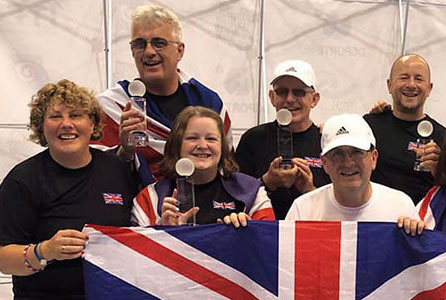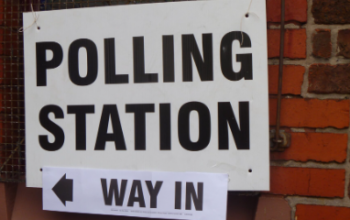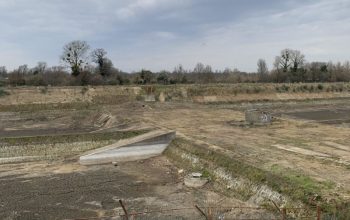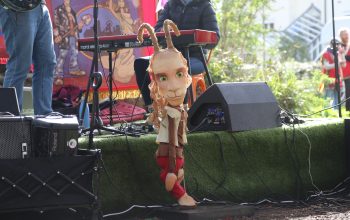When Rachel Morgan first started playing tennis as a hobby four years ago, she never would’ve believed that she would become a two-time British and world champion.
As a budding blind athlete, Morgan mainly began visiting her local tennis centre in Roehampton to access a freedom of movement that had evaded her in everyday life. The determined Brit was even eliminated in the early stages of her initial contests, but she has since progressed, honed her craft, and dominated the competition.
Morgan now plays in the B1 division for those with the highest degree of sight loss, but is struggling to find enough local challengers at her level. Having won the national title in 2017, and lost just a single game in the defence of her crown a year later, she has decided to set two much broader goals for herself.
Not only does Morgan aim to represent Team GB at the Paralympics, but she wants to change the way blind athletes are perceived in society. To help her achieve this, the gifted Brit has now applied for £20,000 consultancy funding from Kingston consultancy firm Performance Communications, designed to fund women’s sport across the UK.
Given that she is also studying for a degree in criminology, Morgan is often forced to balance training for competitions with academic necessity. With the additional funding, however, Morgan claims she would be able to compete more professionally, and raise the profile of her sport in the media.
“At the moment, you’re very much expected to be within a club and pay for your own court fees,” said Morgan. “And the training seems to be focused on hitting time rather than coaching, which is a massive mistake.
“I would like it to get up to the stage where you’ve got more and more intense training, and people can see that you are genuinely an athlete.
“It’s about creating that identity as an athlete first, who is a damn good tennis player, that happens to use a cane as well,” she added.
The Kingston firm’s £20k campaign
Local PR firm Performance Communications set up a new division last year that is dedicated to promoting women’s sport. As part of the launch, the company is offering to provide consultancy worth £20,000 to a selected UK-based female athlete or team, to help them reach their full potential.
The winner of the contest will also be mentored by two-time Olympic gold medalist Victoria Pendleton, and receive media training to help them generate publicity for their sport.
Morgan faces stiff competition for the funding. Clubs such as the Team Torelli cycling group have also applied, with the aim of participating in the inaugural women’s Tour de France. Although the blind tennis star concedes that the prize is hotly contested, she maintains that changing how people perceive blind athletes is vital to sporting equality.
“People just think that you’re cute, cuddly and completely useless without their help,” said Morgan. “Then they see your tennis racquet, and they say ‘Oh God, how do you walk, let alone use a racquet?’
“We should give [B1 tennis] athletes exposure and say you know what, it’s different and you may not immediately understand it, but look at this,” she added. “The way that they send a tennis ball flying is just incredible, in its own way.”
Providing support for women’s sport
The £20,000 contest follows a string of recent high-profile campaigns, such as Sport England’s This Girl Can initiative, that have closed the gender gap in sports participation.
According to data firm Statista, 450,000 more women exercise regularly in England than was the case four years ago. However, Morgan says that more needs to be done to equate female sports with their male equivalents, and views inequality at the Paralympics as particularly problematic.
“Why in the Paralympics is blind football a male-only sport? Why is it so male-dominated?,” asked Morgan rhetorically. “We need to ask, what is the barrier to getting women into sport?”
Although funding remains a barrier to entry for many prospective female athletes, Morgan argues that awareness is also key to driving greater engagement.
“I mean, there’s not a lot of media out there,” said Morgan. “I don’t get as many media requests as the guys on the wheelchair tennis circuit that’s for sure.
“I’ve been doing a podcast with a journalist friend to help raise the sport’s profile, but this needs to be done on a much bigger scale, and appeal to a wider base than just the disabled community,” she added.
Morgan’s Paralympic prospects
B1 tennis’ governing body the International Blind Tennis Association (IBTA) was founded in 2014, and since then it has expanded into 17 countries, and committed to becoming an official Paralympic event.
However, the IBTA has yet to set a date for when this might happen, and the recognition process could be lengthy enough to prevent Morgan from competing at her peak. Undeterred, the competitive Brit maintains that she still aims to one day don the coveted Team GB kit.
“I will not retire until I stand on the middle step of the podium at the Paralympics,” claimed Morgan. “Although… my husband would want to kill me if he heard that,” she added jokingly.
Regardless of whether she wins the funding, Morgan intends to continue campaigning with the athletics brand Wilson, to encourage wider participation in disabled sports. As blind tennis has already given her such a sense of freedom and community, the Brit now hopes that her story will inspire others to follow in her footsteps.
“Don’t let any preconceptions hold you back or feel that you’re vulnerable and unable to get on with it,” said Morgan. “It gives you a shared experience that people from the outside world just wouldn’t understand.”
“It’s also something that allows you freedom, as well as to gain mobility skills and friends, so absolutely go for it, just try it,” she added.
Maybe then, when the winners of the contest are announced in late February, Rachel will take one more step towards achieving her Paralympic dream. If not, the double world champion will at least have raised some much-needed publicity for the sport she’s grown to both dominate and admire in equal measure.
Those interested in applying for Sports Performance’s £20,000 consultancy funding can do so via the dedicated competition website. Entry is open to any UK-based women’s amateur or professional, individual or team, provided applications are submitted by January 10 2021.





